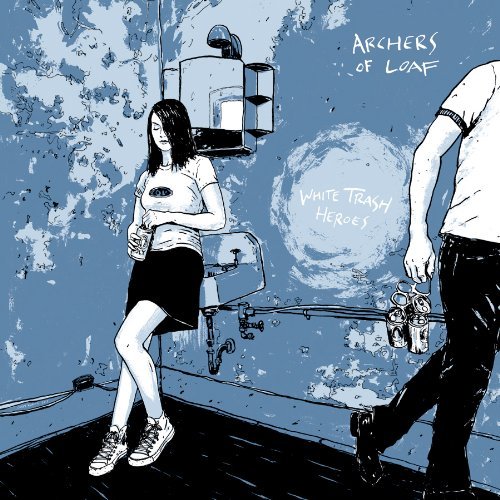Repeating that this is the SIXTEENTH(!) Mountain Goats album isn’t necessarily going to convince swing voters – 'oh well, if they’ve made 16, I suppose it’s time to give them a try…' but what gave me pause for thought is that it’s been ten years since John Darnielle graduated to the indie premiere league, with Tallahassee (2002), on 4AD. A few people who were at their peak then, documenting extremes of the human condition in symbolic language, are on indefinite hiatus now, including David Berman, Jason Molina, and David Foster Wallace (rapidly becoming the Kurt Cobain of postmodernism). Transcendental Youth therefore begs the question: what does it take to go on?
In the mid-to-late-Nineties, when lo-fi was loosely defined by Smog, Silver Jews, Sebadoh, and GbV, The Mountain Goats cropped up as the band who '…if you really like that sound, try this…' ‘This’ being: a guy yelping at his boombox as he battered an acoustic guitar, more percussively than anything else. With a history of substance abuse replaced by a compulsion to churn out cassettes for whoever would release them, Darnielle was poised somewhere between Jandek and Daniel Johnson in the obscurist’s imagination. Even now, most of his songs are 'survivor’s songs' – if not all – in that the surreal humour of some is self-defence, while others confront what happened straight on. Somewhere in between are snapshots of a criminal underworld: the fantasies that keep people stuck in their addiction, pretending it’s all glamorous, two minutes at a time.
If Transcendental Youth is the best thing Darnielle’s ever done, it’s only because it’s about five per cent tighter and better-played. All of the Mountain Goats standards we know and love are present and correct, whether it’s the upbeat number for acoustic guitar, the upbeat number with barrelhouse piano, the downbeat with mournful horns, the downbeat with wildcard instrumentation. 'Amy AKA Spent Gladiator' is a shout of affirmation that seems all the more caring for avoiding an 'Everybody Hurts' sentiment; it’s cutely personalized, like a child’s hand-drawn birthday card. (If you’re a newcomer, by the way, the idea of a gladiator called Amy is typical: the sweet side of surrealism, rather than the ironic side that seems more concerned with being funny than showing its feelings, viz Pavement or GbV.)
'Lakeside View…' shouts out to a different set of people: it’s a tightly focused study of the moments before a dealer arrives; the narrator in his army surplus jacket, covering scrawny arms. When the verse subtly shifts to chorus – "lakeside view / for my whole crew" – it’s desperate to claw some kind of gang mentality and heroism out of the grim reality of being users in a squat. The ‘my’ may be affectionate, but the ‘crew’ are anonymous, possibly no longer with us. 'Harlem Roulette' continues in this vein: yes, it clatters along jauntily, but the key lyric is: "the loneliest people in the whole wide world / are the ones you’re never going to see again." In the last few years, several bands have referenced David Foster Wallace, but Darnielle’s the only one writing Infinite Jest: the Musical.
As ever, Darnielle sings with the urgency of a busker who has to be heard to be paid, but his songs are worth a hundred stadium-anthems because they never lose sight of who they’re for. Recently, Spin magazine named Darnielle 'Indie Rock’s Greatest Lyricist', and while the accolade is quite probably accurate, there’s an obvious bait-and-switch going on: these rudimentary songs with their tried-and-trusted hooks remain vehicles for the lyrics. That’s not to say he hasn’t developed as a musician – like Bill Callahan, the Smog of lo-fi has lifted after years of touring, and elaborate horn arrangements appear on the first single and title track – but Darnielle has figured out what allows him to keep writing, without pursuing the chimera of Relentless Innovation. In more ways than one, that’s what matters, and what allows you to hear and feel fully what makes this vital, 16 albums in.
-
8Alexander Tudor's Score






















